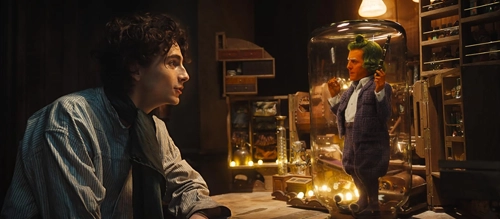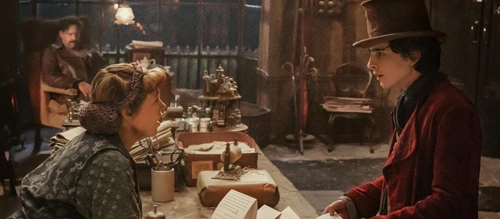
Wonka (2023)
Director: Paul King
Screenwriters: Simon Farnaby, Paul King
Starring: Timothee Chalamet, Calah Lane, Keegan-Michael Key, Paterson Joseph, Olivia Colman, Matt Lucas, Matthew Baynton, Tom Davis, Hugh Grant
Willy Wonka is an enigma. In Willy Wonka and the Chocolate Factory (1971), the original adaptation of Roald Dahl’s 1964 novel “Charlie and the Chocolate Factory,” we don’t learn much about him, other than his desire to find an heir to his candy empire, as well as the cruel delight he takes in teaching naughty children a lesson. Wonka is charming and a little unhinged, paranoid from all of the years he has spent locked away in his factory, making sure no one gets their hands on the secret to his out-of-this-world sweets. With a devilish smile and a playful yet devious twinkle in his eye, actor Gene Wilder infuses Wonka with dimension, but we never dig too deep. He’s a nut that we never quite crack, and he works as a character because of that. There’s a reason why the original novel is called “Charlie and the Chocolate Factory” after all – at the end of the day, it’s Charlie’s journey. Wilder’s performance hints at the layers inside of Wonka that we don’t need to unpeel, but nevertheless know are there. Wonka, the spiritual prequel to the 1971 musical classic, helmed by Paddington director Paul King, does unpeel those layers, but what’s found underneath is a deeply disappointing origin story that lacks the magic and edge that the original (and even Tim Burton’s 2005 remake) has in spades. Touted as a fun-for-the-whole family Christmas classic in the making, Wonka simply doesn’t have enough sparkle to ever hope to achieve that distinction.
Despite its tagline, which insists we will find out how “Willy became Wonka,” Timothée Chalamet’s version of the famous candy maker and magician doesn’t actually become anything. He just kind of already is.
The film begins with Willy, bright-eyed and bursting with optimism, atop a ship mast, where he begins his “I Want” song, “Hatful of Dreams”. Willy arrives in an unnamed city, fresh off the boat, ready to share his chocolate with the world, as his mother (Sally Hawkins) always hoped he would. Willy is earnest and determined, living on nothing but a dream. But the Galeries Gourmet is not what Willy initially imagined it would be. Instead of spreading his creations, he faces opposition and sabotage from three greedy chocolate makers, including Arthur Slugworth (Paterson Joseph), who will soon become his arch-nemesis. Willy then gets tricked into indentured servitude because he cannot read and fails to read the small print on his contract with Mrs. Scrubitt, played by Olivia Colman doing her best over the top Madame Thénardier impression. Aided by Noodle (Calah Lane), a fellow indentured servant and orphan who becomes Willy’s assistant, as well as the rest of the workers, Wonka bids to outsmart the trio and earn the freedom of himself and his friends.
Timothée Chalamet might be the only saving grace in the film, contrary to early assumptions that he may have been miscast. At times he’s charming, funny and endearing, but his performance is constantly in flux and dependent on the material and direction he’s given. When his jokes don’t land, his performance falls flat, even though he is clearly committed to the bit. Thankfully, he doesn’t try to do an impression of Gene Wilder, but he also doesn’t make the character enough of his own to really stand out. This isn’t his fault; he isn’t given much to work with.
All of the obstacles Willy encounters are external. Whether it’s Mrs. Scrubitt’s dishonest business practices, the antics of the greedy chocolatiers, or Hugh Grant’s Oompa-Loompa hijinks, the plot is always happening to Willy. He is almost entirely a reactionary character, and this is a problem in a movie that is supposed to be an origin story, the story of how he became who he is. It would have been nice if he actively participated in the narrative…
Willy’s desire to share his inventions with the world just as his mother hoped is sweet and admirable, but it simply isn’t enough to drive what we see. The writers, King and Paddington 2 co-writer Simon Farnaby (who also appears in Wonka as Basil), were backed into a corner considering Willy Wonka is a recluse by the time we meet him in the original movie. Telling that story would certainly be more interesting, but not very uplifting, so the filmmakers sidestep it entirely. As a result, there doesn’t seem to be any connection between Chalamet’s Wonka and Wilder’s.
Demystifying a character that works the best when we don’t know everything about him is a non-starter (as proven in Star Wars spin-off Solo), but the filmmakers didn’t give much thought to the supporting characters either. Lane and Chalamet work well together, and their friendship is a bright spot in the movie, but most of the supporting characters are so thinly drawn they barely register as real people. As for Hugh Grant’s Lofty, an Oompa Loompa who has been stealing Willy’s candy because he was excommunicated from Oompa Land until he can get back all of the chocolate that Willy stole, he’s surprisingly in very little of the film. The motion capture is jarring and unconvincing, but at least Grant’s contempt for the role, which he has expressed in several recent interviews, doesn’t show on screen.

Wonka, like the original film adaptation, is a musical, but not a very good one. The songs, written by Neil Hannon, King, Farnaby, and Joby Talbot, are unremarkable and lack passion, which is a shame considering Hannon’s exceptional work with The Divine Comedy. The songs in Wonka, especially Willy’s “Hatful of Dreams,” pale in comparison to those written by Howard Ashman, the songwriting genius behind the iconic tunes of The Little Mermaid (1989) and Beauty and the Beast (1991). By comparison, “Hatful of Dreams” lacks interiority or reflection. Perhaps the biggest faux pas in this regard is how Willy’s desire to sell chocolates in the hopes of reconnecting with the spirit of his late mother is barely mentioned. Songs in musicals should, in theory, take place when characters are so full of emotion that words no longer feel enough. And then, they must dance when singing doesn’t feel enough. But nothing drives the songs in this movie and they don’t feel needed. They are boring and directionless. Chalamet’s voice is fine, if a little weak and thin in places, but it’s worth noting that his best performance is when he sings “Pure Imagination”, a song not originally written for this film.
Wonka also strips away any of the melancholy or dark comedy found both in the 1971 movie and Roald Dahl’s overall work. The 1971 film feels a lot like “Alice in Wonderland” in that it is a dreamlike and slightly menacing descent into a magical world, but Wonka smooths all those edges out. As a result, the movie is sickly sweet and above all, nice. Which is ironic, because while the filmmakers were busy adding uplifting lyrics to “Pure Imagination” and simplifying the orchestrations, themes, and social commentaries of the 1971 film, they also made time to make several offensive and outdated fat jokes, aimed at Keegan Michael Key’s Chief of Police, who is dressed in a ridiculous fat suit and gets fatter and fatter the more he indulges in the sweets the greedy chocolate makers use to bribe him with. Using fatness as a shorthand for gluttony and greed, and having an actor who is not fat perform fatness, is hurtful and mean-spirited. It’s hard to believe such an antiquated trope is included in a film made in 2023 – especially one made about the wonderful taste of sweet treats – and it sours the viewing experience. For all of the niceness this movie tries desperately to exude, it makes sure to keep one of the only things from the original film that actually needed updating.
If Wonka is trying to say something, it’s hard to know what that something is. The film plays with themes of oppression, poverty, and greed, but doesn’t do much with them. It would be a losing battle to assume that Western filmmaking would trust its young audience enough to sprinkle in some adult themes, but it is equally weird to mention them in passing and not engage with them. Believing in your dreams and sharing those dreams with others should feel like magic, but the film doesn’t allow us to know these characters enough to genuinely care about them or their dreams.
The sets also leave something to be desired. When Wonka first unveils his factory in the original film, it’s a technicolor dream, calling to mind the reveal of the land of Oz in 1939’s The Wizard of Oz. It is bright and colorful and a little surreal. Wonka feels like a step down in comparison, and the filmmakers’ decision to set a good chunk of the film in the Galeries Gourtmet makes the world of Wonka feel like it’s just floating in space surrounded by nothing. It is small and claustrophobic.
Prequels bait us with the promise that we will get to see some of our most beloved characters become the people we love and remember from our childhoods. In Wonka, Willy may be younger and brighter and less mad than he will soon become, but if you are counting on the film to show you how that happens, you will be very disappointed. Instead, Wonka is a barely passable movie musical that is so sugary it ends up choking on its own sweetness.
Score: 12/24

